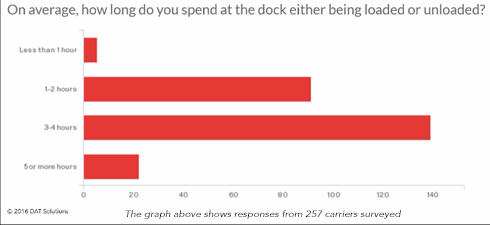Not only are detention fees pricey on their own, the extra time drivers spend waiting around adds up to be a huge cost to them personally. In a survey conducted by DAT, 54% of the 257 carriers and owner-operators revealed they wait an average of 3 to 4 hours every time to get loaded or unloaded. What is causing these excessive detention times and how are they effecting drivers?
What Does Detention Actually Cost?
Detention fees usually range from $30-$50 an hour after the driver has been detained for more than two hours, according to information gathered from those same carriers plus 50 brokers who were also surveyed. This is also if the carrier is actually lucky enough to collect a detention fee.
Two-thirds of the brokers said that they only paid detention when they were able to collect a fee from the shipper consignee. When a broker is able to collect from the shipper, they were twice as likely to pay detention fees to the carrier.

These detention fees are just a drop in the bucket compared to how much that time actually costs trucking companies. One owner-operator cited a $1,900 loss due to two loads he was unable to accept because of a lengthy detention at a receiver's dock. Another driver wrote, "I do not want to spend my time fighting for a few dollars of detention pay. My company loses 1-2 working days in a 10-day period due to unreliable unloading times.
How do we Fix This?
For one, carriers and brokers can work together to hold shippers accountable. When the broker is able to collect from a shipper, the carrier is twice as likely to get paid detention fees. Two-thirds of the brokers said they only pay detention when the shipper covers that expense, but with detention fees averaging $30-$50 an hour, that doesn't help much, especially if getting detained means you've missed your next load.
Others have also suggested putting together a website that lets carriers rate and review shippers. Each shipper would then get a score, which a carrier could look up before accepting a load. Or the carrier could take into consideration when negotiating a rate. If the industry doesn't work to find a solution, the government is probably going to have to step in.
What are your thoughts?
"It's a matter of fairness. Many shippers and receivers are lax about their dock operations, but it's the carriers and drivers who are forced to pay for that inefficiency."- Don Thorton, Senior VP at DAT Solutions
Note: This article was adapted from the DAT TruckersEdge blog post. It was first published in July, 2016.
FTS Plus+ partners with DAT to offer a special on the TruckersEdge load board to its members. Sign up for DAT TruckersEdge today and get your first 30 days free and 10% off for life by signing up at www.truckersedge.net.
*This offer is available to new TruckersEdge subscribers only.